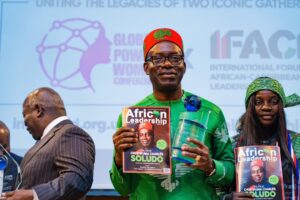
By Romanus Udekwe Okue-Agbomma, LL.B., ACIArb
As Anambra State approaches the gubernatorial election on 8 November, the political calculus points overwhelmingly towards one outcome: a resounding victory for Governor Charles Soludo. Whilst elections are never foregone conclusions, the confluence of political tradition, strategic alignment, infrastructural progress, and the calibre of opposition makes Soludo’s re-election not merely probable but inevitable.
The zoning convention, though unwritten in Nigeria’s constitution, has emerged as the most equitable mechanism for power rotation in Anambra State. Soludo, hailing from Anambra South, has served barely four years of what should be an eight-year tenure for the South before power transitions to Anambra Central and subsequently to Anambra North. This arrangement reflects the political maturity of Anambra’s electorate, who understands that premature disruption of this rotation would breed resentment and instability. The people of Anambra South deserve their full term, and voters across the state recognise that honouring this convention strengthens democratic fairness for all zones. To truncate Soludo’s tenure now would be to abandon a principle that has served the state’s unity well.
What makes this zoning imperative even more compelling is the constitutional arithmetic at play. Soludo, having already served four years, can only constitutionally serve one additional term of four years—guaranteeing that power moves to Anambra Central by 2029. This constitutional limitation provides certainty and reassurance to other zones that their turn will come on schedule. The All Progressives Congress (APC) candidate, Prince Nicholas Ukachukwu, however, also hails from Anambra South. Should he somehow prevail, he would naturally seek to govern for the full eight years permitted by law, effectively extending Anambra South’s hold on power until 2033. This would mean twelve consecutive years for one zone—a gross distortion of the zoning arrangement that would justifiably outrage Anambra Central and North. The mathematics alone should trouble any voter concerned with equity: Soludo offers four more years and then transition; Ukachukwu threatens eight years and prolonged monopoly. In this light, voting for Soludo is not merely choosing continuity—it is safeguarding the very principle of rotational fairness that keeps Anambra’s political fabric intact.
Beyond local considerations, Soludo’s strategic relationship with President Bola Tinubu represents a significant political asset. Their long-standing friendship and Soludo’s “progressives working together” philosophy have fostered a collaborative dynamic between Awka and Abuja that directly benefits Anambra. In Nigerian politics, where federal support can determine a state’s access to resources and developmental interventions, this alignment is invaluable. Soludo has demonstrated the wisdom of constructive engagement over confrontation, positioning Anambra to benefit from federal programmes and infrastructure investments. This pragmatic approach ensures that Anambra is not left behind in the national scheme.
The question of competence and intellectual credibility cannot be divorced from this election. Prince Ukachukwu, whose educational credentials remain shrouded in controversy and doubt, simply does not meet the standard that Anambra people expect from their governor. This is not a state of ordinary pedigree—Anambra has produced titans of intellect and achievement: Dr. Nnamdi Azikiwe, Chukwuemeka Odumegwu Ojukwu, Chief Chuba Okadigbo, Philip Emeagwali, Chimamanda Ngozi Adichie and several others. The bar is set extraordinarily high, and voters will not lower it for expediency. In a state where education is revered and academic excellence is a point of pride, a candidate whose own educational background raises questions cannot credibly lead. Soludo, by contrast, is a globally recognised economist, a former Central Bank Governor, and a man whose credentials are beyond reproach. The comparison is not merely unfavourable to Ukachukwu—it is politically fatal.
Most importantly, Soludo is delivering. His administration has focused on building the infrastructure necessary for sustainable economic growth—roads, bridges, and systems that will serve Anambra for decades. Whilst critics may quibble over pace or priorities, the foundational work being laid is undeniable. Development is not merely about quick fixes and populist gestures; it requires vision, planning, and execution. Soludo possesses all three. His approach is methodical, evidence-based, and oriented towards long-term prosperity rather than short-term applause.
When voters in Anambra cast their ballots on 8 November, they will weigh tradition against disruption, competence against questionable credentials, strategic alignment against isolation, and sustainable development against empty promises. On every measure, Soludo holds the advantage. His re-election will not be a narrow escape but a decisive mandate—a clear signal that Anambra knows quality leadership when it sees it and will not gamble its future on unproven alternatives. The margin of victory will reflect not arrogance but the simple recognition of political reality: Soludo has earned another term, and the people of Anambra will grant it to him overwhelmingly.



